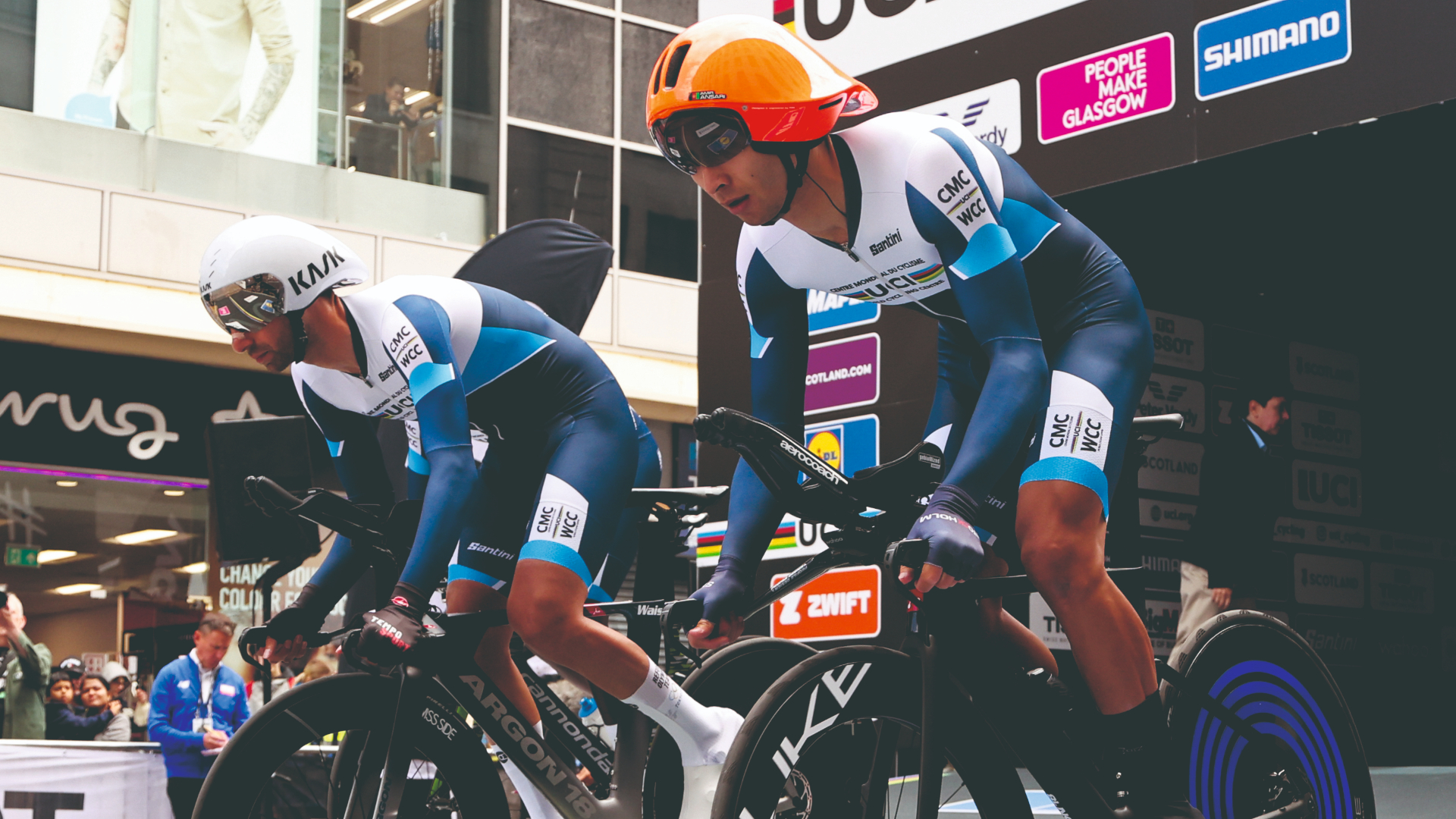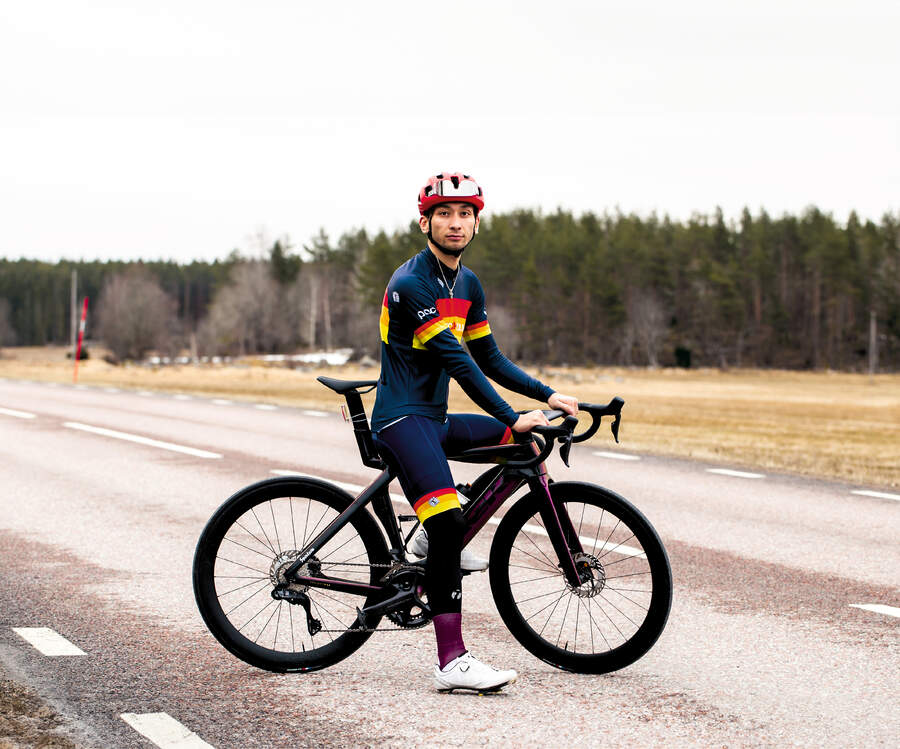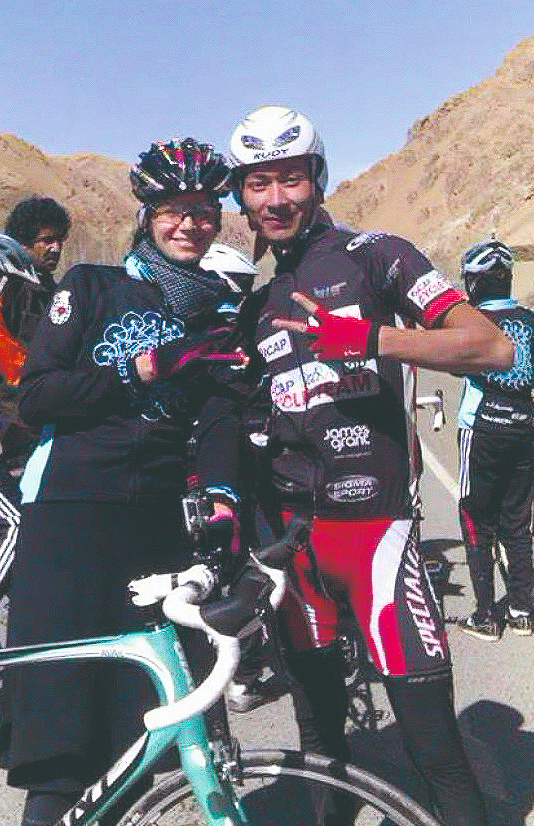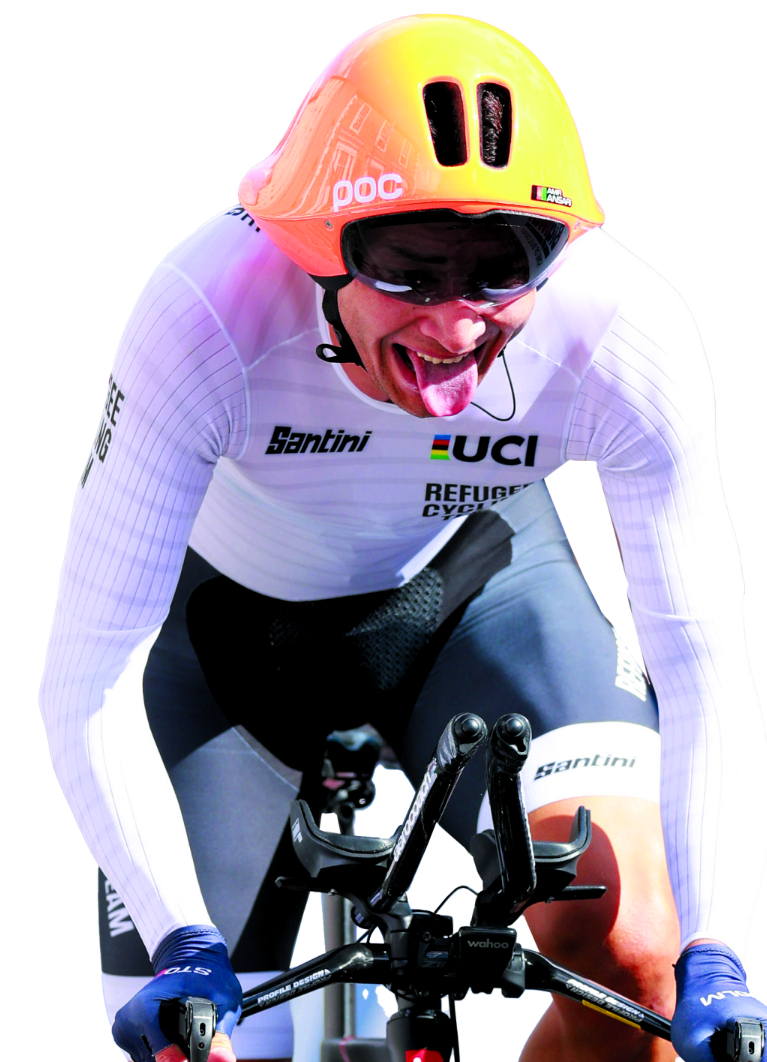
“I am going to be a professional cyclist,” Amir Ansari told a friend resolutely, days after crossing the Aegean Sea in a small rubber boat. It was autumn 2015 and only a few weeks earlier he had fled from Afghanistan in search of safety, carrying with him only the contents of a small backpack. His dream, as it existed then, could not have been more distant from the reality of his situation.
Ansari, now 24, was born as a refugee in Iran in 1999, where he grew up for the first 10 years of his life with his mother, father and three younger siblings. He and his family are Hazara, one of the groups who are systematically persecuted by the Taliban. In 2009, western forces were making an increased push against the Taliban in Afghanistan, and the Ansari family returned to their homeland, moving to western Kabul, to the relative security of a community where Hazara were in the majority.
As a child, Ansari cycled through the busy streets of Kabul to school as a cheap mode of transport. The bike was decades old, but it gave him a sense of freedom he’d never felt before. One day while on his commute, he spotted a pair of cyclists on road bikes, clad in Lycra. “They just looked cool,” he tells me by video call from his home in Uppsala, Sweden. “I wanted to try it.” This innocuous moment ignited in Ansari the unlikeliest of dreams.
After befriending the two cyclists, he joined them on training rides on a borrowed road bike. They would ride three hours into the foothills of the majestic Hindu Kush mountain range and back again. He became part of the small but active Afghan cycling community and dreamed of one day, somehow, becoming Afghanistan’s first professional cyclist.

Seeking refuge in Europe
The mid-2010s saw the rise of ISIL (later known as IS) who also targeted the Hazara people. Stories of executions and kidnappings were commonplace. The previously safe community where the Ansari family lived now witnessed regular attacks. In 2015, Ansari’s mother decided that her son, then 16, should flee the country by himself in search of a more secure, more prosperous life.
His father had died, and she felt that this was the only chance for at least one of the family to live the life she hoped dearly for. “You are going to die anyway if you stay here,” Ansari recalls his mother telling him. “She didn’t want me to die in Afghanistan in an explosion or some terror attack,” he says. “She wanted me to give it a try to make my future... their future.” The decision was made. Mother and son sat silently, looking at each other. “I think in that look we communicated a lot of words without saying anything,” he says.
Ansari left his family with one goal in mind: Europe. He travelled to the west coast of Turkey, to the place with the shortest water crossing to the safety of Greek territory. “Around 3am, they started pumping up the gummy boat,” Ansari remembers. “It’s for nine people, but they just put in 20 or 30.” Making it to the island of Lesbos, to one of the largest refugee camps in Europe, Ansari was relieved to be alive.
A few days before, he had messaged his friend, the US adventurer-activist Shannon Galpin, whom he had met while she was developing the first generation of female Afghan cyclists. Galpin was in Colorado at the time, but when she realised Ansari needed help, she dropped everything and flew to Greece to meet him. They rode together from Athens. “He was fairly stoic until we got back down into town,” Galpin recalls. “Then he just looked exhausted. It broke my heart.” She could see the effect that exile was having on Ansari, but recalls that he didn’t seem scared, only determined. Focusing not just on the journey and what he had to do next, Ansari was also holding on to his hope for the future.
Even at this point, he reasserted his dream of becoming a cyclist. “That is the thing that kept him going, that kept him putting one foot in front of the other,” Galpin says. On buses, rails and feet, Ansari made his way north, finally ending up in Stockholm, Sweden.

Amir Ansari grew up in Afghanistan, his family belonging to the Hazara ethnic group, Shia Muslims who are persecuted by the Taliban.
The Hazara are one of the largest ethnic minorities in Afghanistan.
There have been reports of Hazara discrimination in Afghanistan for over 400 years.
The group continues to be targeted as Shia Muslims in a majority Sunni Muslim country.
In 1998 one of the most brutal attacks on Hazara took place in the city of Mazar-i-Sharif, where thousands were systematically executed.
Today attacks on Hazara in Afghanistan continue frequently, and thousands have fled to other nations to seek refuge.
A new life in Sweden
Ansari moved into a camp for asylum seekers which offered a range of sporting activities – but he just wanted to cycle. After searching online, he arranged to join Stockholm Cykleklubb for a session. One of the first people Ansari met at the club was Pierre Moncorgé, a French Continental-level racer and a coach at the club.
Moncorgé describes he initial impression of Ansari as “a pretty shy teenager” clearly affected by the journey he had undertaken. “However, as soon as he was on the bike or around the club he was so happy to be there, always smiling and kind to everyone.” The club was the perfect escape for Ansari, who was fast-tracked to their elite team, which raced across Sweden. He showed “great potential,” according to his new coach Moncorgé, and was nicknamed “the Afghan Peter Sagan” because of his punchy abilities and how he idolised the great Slovakian.
Away from the club, life in the camp was tough. Ansari experienced a deep depression and began having suicidal thoughts. It was while in one of his darkest moments that he again messaged Galpin, who replied: “Tomorrow, you’re going to go cycling with your club. Promise me that, Amir.” Looking back, Galpin is convinced, “It was the bike that saved his life”.
The immigration process proved endlessly difficult. Although Ansari was helped by a lawyer at the cycling club, political pressure meant almost every residency application was denied. Finally he was kicked out of the camp, rendered homeless. It was the cycling club who came to his rescue. A family from the club had a spare bedroom and took him in.
Ansari was grateful, but his depression did not abate. Through therapy, the support of his new Swedish family – where he became an “extra son” – and cycling, Ansari started to rebuild his life. “The family were a big support. They were so kind. They made me think so positively; to look on the bright side of life. The whole of the Stockholm Cycling Club was like my family as well.”

The IOC Refugee Olympic team was created in 2015, represented by 10 athletes at the 2016 Games in Rio. It has more than tripled in size since then, with 36 refugee athletes due to compete in Paris. Amir Ansari is one of two cyclists on the team, the other being Ethiopian Eyeru Tesfoam Gebru, who will take part in the women’s road race. Eleven countries will be represented across 12 different sports. Most of the athletes were selected from among the refugee athletes supported by the IOC through the Refugee Athletes Scholarship Programme.
The team’s appearance at the Olympics will draw attention to the plight of the estimated 114 million people forcibly displaced worldwide. The UN high commissioner for refugees Filippo Grandi stated: “The Refugee Olympic Team should remind us of the resilience, courage and hopes of all those uprooted by war and persecution”.
Dreams become reality
While balancing school with his training, Ansari travelled around the country to race. Sweden is a nation where time trialling is the primary discipline, so that soon became his main focus. The Taliban returned to power in Afghanistan in 2021 as the USA pulled out troops. Ansari’s mother and siblings escaped back to Iran the day before Kabul fell. It was a fearful time for Hazara in Afghanistan, but a time of opportunity for Ansari in Sweden. He was granted temporary residency, was able to apply for university, and started working in a school for children with disabilities. He also competed in his first UCI races in Poland, and finished ninth in the 2021 Swedish National Time Trial Championships.
An even bigger breakthrough came when Ansari was offered a scholarship by the Olympic Refugee Foundation, which granted a spot at the 2023 World Championships in Glasgow and the potential of future Olympic Games opportunities. The experience in Glasgow was momentous for Ansari, the realisation of his long-held ambition. “All the way I thought it was a dream,” he says, “until the TTT in the city. I started leading out the team for the first corner and I thought: ‘wait, no it’s not a dream. Wake up, Amir, you have to push now’. It was one of the best weeks of my life. I’m not going to forget it.”
Now Ansari has his eyes set on the biggest sporting stage of all in Paris this summer, where he will compete with the Olympic Refugee squad. He has recently started studying for a degree in structural engineering at Sweden’s University of Uppsala, but spends every spare moment training, guided by coach Moncorgé. “My whole life at the moment is bed, training, go to school, eating. The dream makes me motivated to be disciplined.”
Ansari doesn’t think of himself as Afghan anymore. He is Hazara, and in that identity he feels the weight of a tortured communal history. He hopes that his appearance in the Olympic Games time trial will give hope to others who have had to flee their homelands. “In this world, we see war everywhere,” he says. “A lot of people are losing their dreams. They might need an example to show them that there is a chance, there is a hope. In the Olympic Refugee Team, I think we keep that dream alive for those people.”







